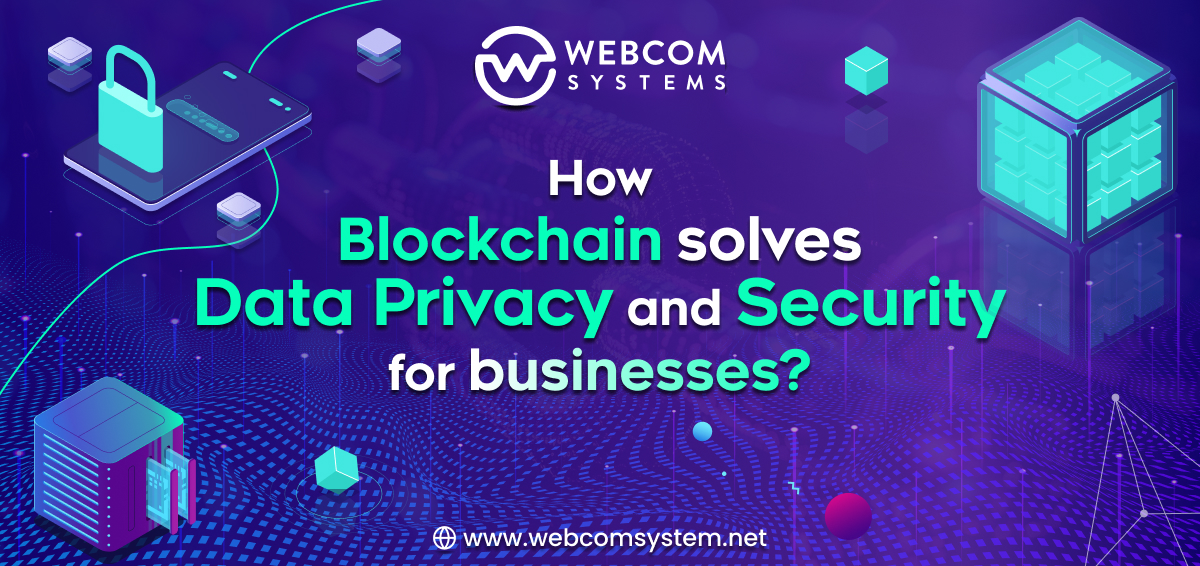With the increasing amount of digital data businesses handle, hackers constantly find new ways to steal this sensitive information. Therefore, data privacy and security have become crucial for businesses. Even a small oversight could result in reputational damage as well as financial loss. However, traditional security measures have limitations, exposing this sensitive data to severe threats. As a result, businesses are turning to advanced technologies like blockchain solutions to overcome evolving threats. But how exactly does blockchain technology achieve this?
Understanding Blockchain Technology
Blockchain is an immutable and distributed digital ledger that enables the initiation, processing, and completion of transactions. These transactions are recorded and linked together in a chain of blocks, which is why it is termed blockchain technology. Each block contains information like price, location, quantity, and other relevant details. When ownership is transferred, the transaction is securely recorded, capturing the time, sequence, and other key data.
All transactions processed through blockchain development technology are secure, transparent, and tamper-proof. Thus, the technology facilitates several cybersecurity benefits and solutions that differ as per the type of blockchain used.
Types Of Blockchain Technology
Public Blockchains
There are no restrictions for joining a public blockchain, so anyone with internet access and a computer can join the network anonymously. It is decentralised in nature, and there is no identity or access control. The computers participating in the network have records of other nodes or blocks of the network. Using public key encryption, users can verify transactions or records and reach a consensus. Bitcoin is the most common example of a public blockchain, and the consensus is reached through Bitcoin mining.
Private Blockchains
Private blockchains are not as transparent as public blockchains because they are not fully decentralised. Only known users are authorised to access the network, verify transactions, and maintain the ledger. Private blockchains are operated in a closed network and are mostly controlled by well-known entities and organisations. These blockchains achieve consensus through “selective endorsement.”
Key Components Of Blockchain Solutions That Ensure Data Privacy And Security Issues
Decentralisation
Decentralisation is a fundamental aspect of blockchain development technology. It provides the foundational characteristics of a distributed and autonomous network. Thus, no single party holds the authority of the network. The validation and other crucial controls are equally distributed over all the participating nodes of the network. Decentralization reduces the risk of a single point of failure. Therefore, it enhances the security of the blockchain network and offers trust and peace of mind to all the network participants.
Distributed Build
The ledger of blockchain solutions is distributed across all nodes in the network. This allows for the creation of decentralized and distributed databases. All participating nodes will have a record of the entire blockchain, ensuring consistency and stability. Furthermore, the network remains operational even if some nodes are compromised due to its lack of a single point of failure.
Cryptography
Blockchain transactions are cryptographically secure, and their blocks are sealed on the network. This is why blockchain is used in business operations to provide integration, security, and rigorous verification. Essentially, it generates two keys for network members to access the ledger: the public key and the private key. Transactions involving two participants would not be carried out if one of their private keys was compromised. With this safeguarding, the transactions are kept safe from fraud.
Encryption
The encryption feature opted for in blockchain follows the same principle as traditional encryption methods, but it’s more secure. Asymmetric key algorithms and hash functions are two powerful encryption techniques used to secure data integrity. Asymmetric-key algorithms use a pair of keys to encrypt and then decrypt data. Whereas, hash functions work by creating a unique identity of data that is impossible to alter. When both are combined, the data becomes unusable and unreadable for spammers.
Immutability
Immutability is a key feature and a key identity of blockchain technology. Once a block is added to the blockchain network, it cannot be changed or deleted. This is because any changes to a block require the consensus of the majority of nodes. Immutability allows blockchain to be immutable, secure, and tamper-proof.
Consensus Mechanism
Blockchain follows highly secure consensus mechanisms such as Proof of Work (PoW), Proof of Stake (PoS), and Delegated Proof of Stake (DPoS). A consensus mechanism helps to ensure that the agreed-upon state and consistency are maintained at every node’s end of the network. It allows the validation of transactions along all the nodes when added to the blockchain in the form of blocks.
Smart Contracts
Smart contracts are essentially self-executing programs that operate within blockchain technology. They are written in a specific programming language and follow a set of rules and conditions on a blockchain platform. Once the predefined conditions are met, the smart contracts are executed automatically, eliminating the need for third-party involvement.
Applications Of Blockchain Solutions For Data Privacy And Security
Secure DNS and DDoS
Domain Name System (DNS) allows centralized access to websites and online services using just the domain names instead of IP addresses. Thus, this internet component, DNS, is vulnerable to Distributed Denial of Service (DDoS) attacks. They can slow down and even crash down entire websites and networks. Blockchain-backed DNS solutions are a secure and decentralized alternative to standard DNS systems. They make them more safe from being attacked by hackers.
IoT Security
The Internet of Things (IoT) enables devices to collaborate, forming a network of interconnected devices that not only communicate but also share data with each other. Integrating blockchain into IoT further facilitates decentralizing administrative authority, encrypting transmitted data, and enabling real-time tracking of all connected devices.
Secure Messaging
Most businesses rely on messaging apps such as Skype, Slack, Microsoft Teams, etc. for professional conversations. Through these channels, the company’s critical operational data is shared. However, these platforms are quite vulnerable to hackers and spammers. To address this, messaging platforms are being developed with blockchain. These blockchain-based messenger apps allow end-to-end encrypted conversations that ensure the privacy of shared messages.
Ownership validation
The Blockchain developmental technology allows for the formation of immutable records of authenticity, providing a secure and transparent way to verify ownership and identity. Thus, businesses can use blockchain-based solutions to perform Know Your Customer (KYC) through the Distributed Ledger Technology (DLT) system, and use cryptographic keys to ensure the integrity and authenticity of data.
Immutable Data Storage
Existing data storage systems used to store important business data are vulnerable to hackers. However, blockchain-based data privacy techniques follow a decentralized approach, allowing the storage of data on a decentralized network. The data is stored in an encrypted form and spread across the network. Therefore, even in the event of a single node breach, the database as a whole is safe and secure.
Conclusion
Blockchain development technology offers a much safer, more secure, and more transparent approach to recording and transferring the private data of companies. For businesses looking to safeguard their operations against data breaches and cyber threats, partnering with a trusted blockchain development company is essential. Webcom Systems specializes in delivering tailored blockchain solutions and has helped thousands of businesses protect their data from data breaches and cyber-attacks. Get in touch to know more.
Recommended Read: 5 Potential Features Of Blockchain Technology!




